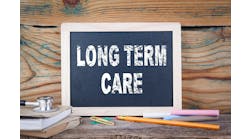Poor information sharing between hospitals and nursing homes is a significant problem, contributing to the adverse events within 45 days of hospital discharge experienced by nearly 40 percent of nursing home residents.
Indianapolis-based Regenstrief Institute research scientists Kathleen Unroe, M.D., M.H.A., and Joshua Vest, PhD, M.P.H., and colleagues from Probari, a start-up company founded by Unroe and Russell Evans, R.N., M.H.A., have developed and demonstrated the feasibility of a prototype nursing home-facing app targeting improved information exchange and better care for these high-risk transitions.
The researchers published details about their work in the Journal of Post-Acute and Long-Term Care Medicine (JAMDA).
The app is tailored to the needs of nursing home nurses for robust, timely and accessible health record data as a transfer from a hospital to a nursing home takes place. The app enables provision of information to support a seamless transition of care across settings no matter what electronic medical record systems the discharging hospital or the receiving nursing home use and is FHIR-compliant.
“The challenge we are addressing with the creation of our app is that healthcare is a very diverse landscape of institutions. Hospitals and nursing homes typically run different information systems, so information sharing, which is critically important for optimal care of the nursing home resident, is problematic,” said Vest, in a statement. He is an informatician who has deep interest in both interoperability and social determinants of health. “We built a computer application to leverage existing technology infrastructure to pull information in a systemized, organized and appropriate format to fit workflow needs in nursing homes.
“One of the more revealing findings we learned from our end users was their need for sharing of both clinical and social data, clearly reflecting that we're talking about care for individuals who live in nursing homes,” said Vest. “So, when we talk about the information moving from a hospital to a nursing home, it really has to encompass not only what they —nursing home residents — need for care, but what they also need for daily living and what they need to live their lives ongoing, which was a new kind of twist from this study. And that’s what we built into our app.”
To develop the app, the researchers surveyed nurses and other stakeholders at multiple nursing homes on their information needs and usability requirements.
In 2022 the National Academy of Sciences, Engineering, and Medicine's “The National Imperative to Improve Nursing Home Quality” stated: “Poor communication between nursing homes and hospitals is one of the key barriers to safe and effective care transitions.”
“To provide high quality care for a new or returning resident, nursing homes need to know many things – including blood pressure, pulse, temperature at time of discharge,” said Unroe, in a statement. She is a geriatrician who cares for nursing home patients and has led research studies on avoidable hospitalizations of nursing home residents. “What medicines were administered during the hospital stay and what was the most recent time each was given? Is the patient cognitively impaired? What was the living situation when the person entered the hospital? Our app transfers that information to the resident’s nursing home care team.
“It matters not only that nurses at nursing homes have access to up-to-date information about what happened during the hospital stay. Access to this information has to be at their fingertips so it is in front of them when and where they need it in order to provide care for that resident,” she added. “It is inefficient and it's dangerous to be distracting the clinical people at the resident’s bedside by expecting the staff member to go into another room and locate often incomplete paperwork or dig into voluminous computer records trying to find basic pieces of information.”
The researchers say the app performed well and was well received by the potential users surveyed. The next step will be development of the prototype into a fully functioning hospital-to-nursing home transfer app. They plan to test it in real time with actual transfers to confirm that it will support nursing home nurses to efficiently and safely admit patients as well as to ensure that there is no disruption in the clinical care plan created by the hospital due to transition to a nursing home.
This work was supported by a Small Business Innovation Research grant from the National Institutes of Health’s National Institute of Nursing Research.


